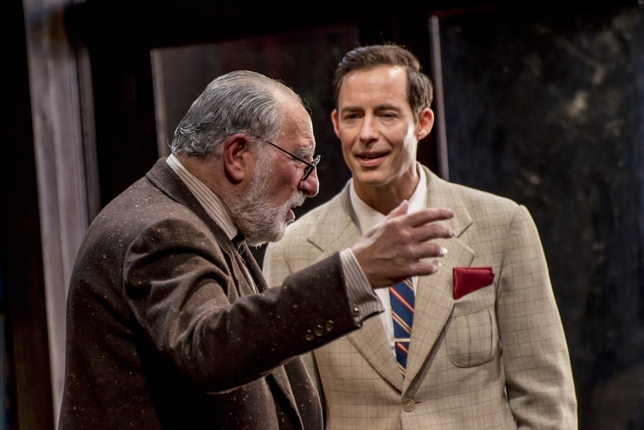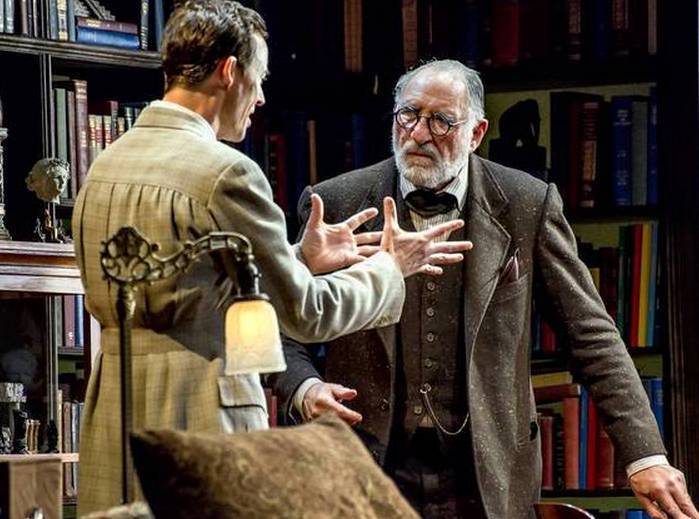
Maxwell Anderson did it in his 1936 play Mary Of Scotland. Steve Allen did it in his late 1970s TV series Meeting Of Minds. And now playwright Mark St. Germain does it in Freud’s Last Session.
What these writers have in common is that all three imagined what might have happened had famous historical figures actually met, like Anderson did with Queen Elizabeth I and Mary Queen Of Scots, or in the case of Germain’s off-Broadway smash, now playing at Santa Monica’s Broad Stage, the Father Of Psychoanalysis (and confirmed atheist) Sigmund Freud and the Chronicles Of Narnia creator (and Christian apologist) C. S. Lewis.
 St. Germain ups the stakes considerably by having the then 83-year-old Austrian émigré and the 41-year-old Dublin native meet in London on precisely the day that Great Britain declared war on Germany, three weeks before Freud chose to take his life rather than face unbearable pain from inoperable oral cancer, and not all that many years after Lewis’s conversion from atheism to Christianity.
St. Germain ups the stakes considerably by having the then 83-year-old Austrian émigré and the 41-year-old Dublin native meet in London on precisely the day that Great Britain declared war on Germany, three weeks before Freud chose to take his life rather than face unbearable pain from inoperable oral cancer, and not all that many years after Lewis’s conversion from atheism to Christianity.
Though Lewis believes initially that he has been summoned to the psychoanalyst’s home to be tongue-lashed for a recent satire of Herr Doktor, he soon learns the real reason for the invitation.
“I wanted to learn how a man of your intellect could suddenly abandon truth and embrace an insidious lie,” declares Freud, to which Lewis responds with absolute confidence that “There is a God, and a man does not have to be an imbecile to believe in him.”
What follows is a passionate 80-minute exchange of ideas that could easily have become nothing more than an overly dry, overly intellectual philosophical debate (and does at time come precariously close to being just that).
Fortunately St. Germain injects considerable humor throughout, much of it thanks to a Dr. Freud with enough cleverness and wit to host a pre-Dr. Ruth talk show.
Take for example, Lewis’s revelation that The Word came to him on a motorcycle ride, a story which prompts Freud to wonder why the younger man was a passenger in the sidecar rather than in the driver’s seat as was his Biblical predecessor Paul on the road to Damascus. (The punch line is that Lewis didn’t know how to drive.)
Having Freud and Lewis’s meet on the first day of war between Great Britain and Hitler’s Germany adds considerable dramatic tension, Freud continuing throughout the play to switch on the radio for the latest news. (We even hear a snippet of George VI’s speech to the nation, our recollection of which in The King’s Speech adds power to this decisive moment in European history.)
The sudden sounding of an air-raid siren (accidental it turns out), sends both men flashing back in time as they reach for the gas masks Freud (and one would presume most Londoners) had on hand in late 1939, the piercing wail reminding Freud of the horrors he was escaping from when he emigrated to England, the same sound sending Lewis back to a horrific memory of having his best friend’s body parts splattered against him in a particularly bloody bomb blast in The War To End All Wars.
Each man gives as good as he gets. Freud defends his disbelief in a higher power with a list of the horrors a benevolent god would never allow. Lewis insists that there can be no joy without a Divine Being, and that Jesus was indeed His son, and no mere madman. Freud reminds Lewis that he has undergone thirty operations, each more painful than the previous, only to have cancer continue to consume his mouth and everything around it. Lewis points out that without a God, Freud would not have survived those thirty surgeries, including one in which his life was saved by a patient who was even worse off than he was at the time—no mere accident that.
 The Broad Stage production of Freud’s Last Case may be merely the latest of many since its off-Broadway debut, including runs in Chicago, San Francisco, Atlanta, Cincinnati, and San Jose, but none can match the Broad’s in star power, the play’s dueling protagonists played this time round by Emmy, Tony, and Golden Globe winner and Oscar nominee Judd Hirsch as Freud, and by TV Guide Award winner and Golden Globe nominee Tom Cavanaugh as Lewis.
The Broad Stage production of Freud’s Last Case may be merely the latest of many since its off-Broadway debut, including runs in Chicago, San Francisco, Atlanta, Cincinnati, and San Jose, but none can match the Broad’s in star power, the play’s dueling protagonists played this time round by Emmy, Tony, and Golden Globe winner and Oscar nominee Judd Hirsch as Freud, and by TV Guide Award winner and Golden Globe nominee Tom Cavanaugh as Lewis.
At 77, Hirsch is going stronger than ever, his performance as Freud combining the comedic gifts honed in his years starring on sitcoms Taxi and Dear John, and the dramatic chops demonstrated in feature films like Ordinary People, which snagged Hirsch that Oscar nom, work on The Broad Stage that could easily put him on the short list for L.A. theater award nominations as well.
For those who only know Cavanaugh from Ed, the primetime sitcom that brought him into millions of living rooms, the still-youthful-at-49 TV star’s dynamic work as Lewis will surely be a revelation, beginning with his spot-on British accent, a performance so authentic that the lanky 6-footer might easily have gotten off a direct flight from Oxford University to L.A.
Both performances benefit from its original helmer Tyler Marchant’s astute direction, the action unfolding on the superbly detailed set created by its original off-Broadway designer Brian Prather. Mark Mariani costumes Freud and Lewis for the fifth time, and terrifically so. Freud’s Last Session’s original off-Broadway sound designer Beth Lake is once again on board and responsible for the authentic sounding radio broadcasts and air raid sirens. Lighting designer Clinton Taylor is a repeater as well, his work here every bit as fine as his design colleagues.
Donald William Myers is production stage manager for The Eli and Edyth Broad Stage, under the direction of Dale Franzen.
Freud’s Last Case may not be for every theatergoer. It helps to have a love of ideas and of history to fully appreciate the experience. But theater aficionados with both will find this thought-provoking dramedy heady and satisfying fare.
The Broad Stage, Santa Monica College Performing Arts Center, 1310 11th St., Santa Monica.
www.TheBroadStage.com
–Steven Stanley
January 16, 2012
Photos: Ben Gibbs


 Since 2007, Steven Stanley's StageSceneLA.com has spotlighted the best in Southern California theater via reviews, interviews, and its annual StageSceneLA Scenies.
Since 2007, Steven Stanley's StageSceneLA.com has spotlighted the best in Southern California theater via reviews, interviews, and its annual StageSceneLA Scenies.







 COPYRIGHT 2024 STEVEN STANLEY :: DESIGN BY
COPYRIGHT 2024 STEVEN STANLEY :: DESIGN BY